Effects of Organisational Culture, Power and Politics on Individual's Performance and Behaviour
VerifiedAdded on 2023/01/12
|14
|4719
|68
AI Summary
This report discusses the effects of organisational culture, power and politics on individual's performance and behaviour. It also explores various theories of motivation and the achievement of objectives and goals in a business organisation.
Contribute Materials
Your contribution can guide someone’s learning journey. Share your
documents today.
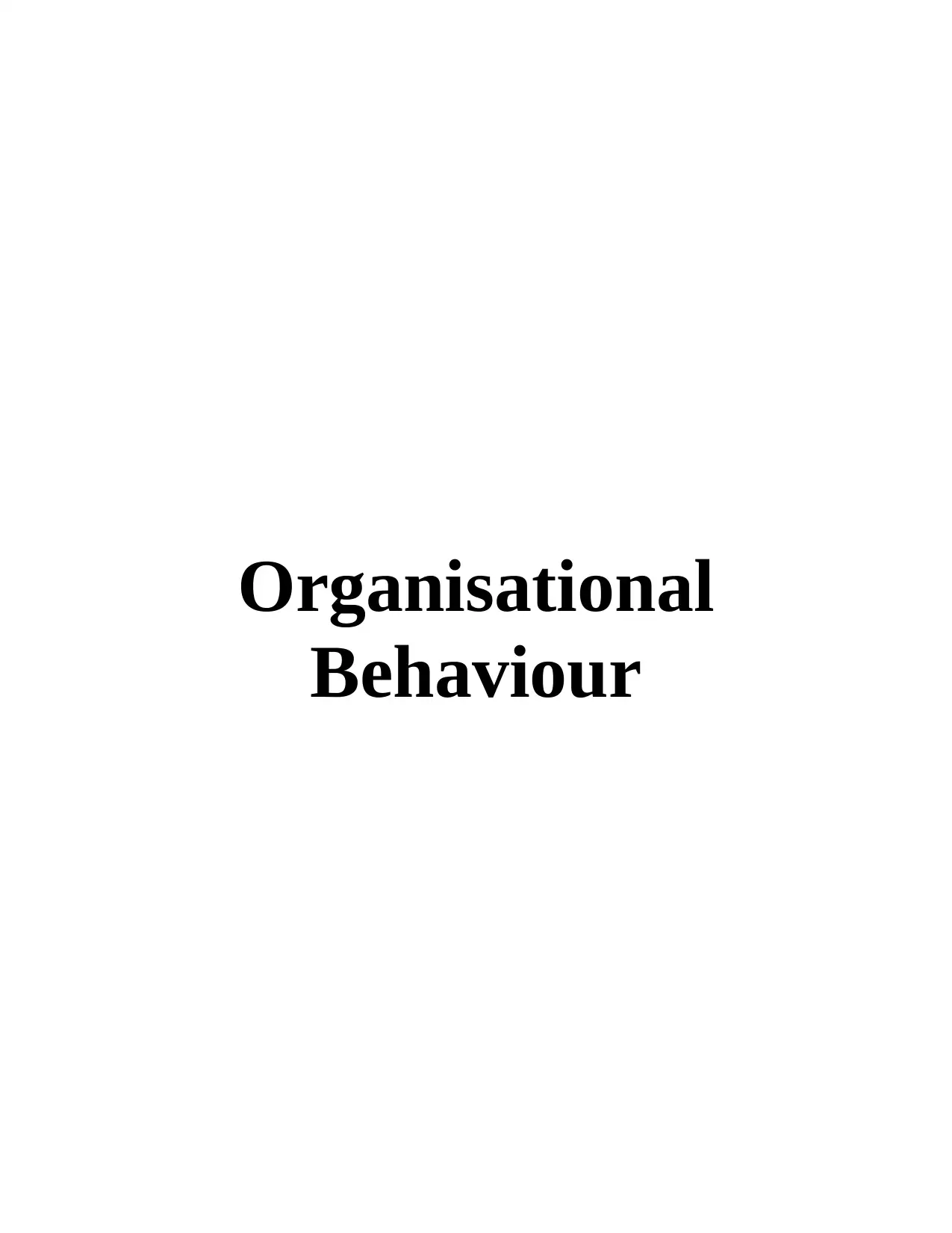
Organisational
Behaviour
Behaviour
Secure Best Marks with AI Grader
Need help grading? Try our AI Grader for instant feedback on your assignments.
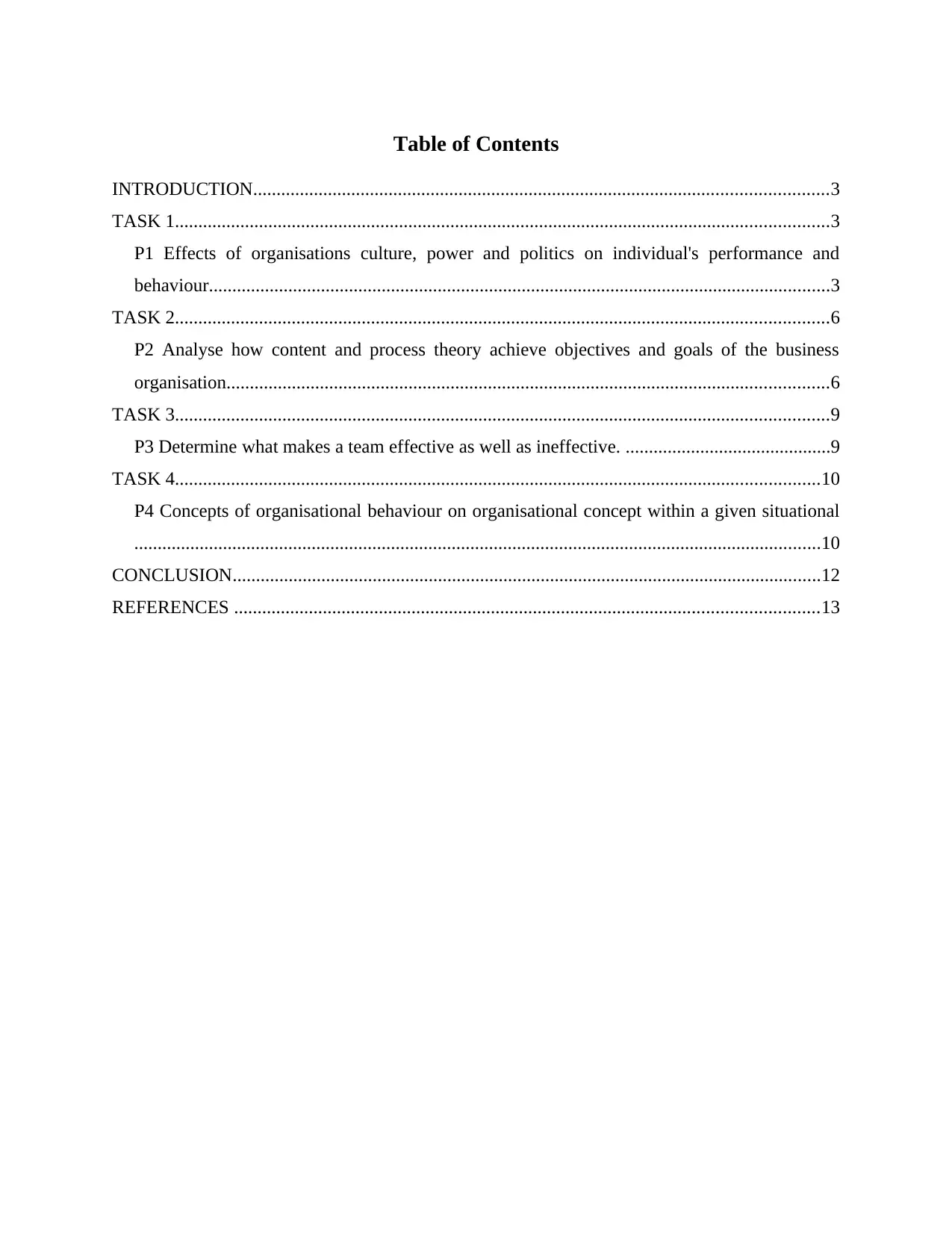
Table of Contents
INTRODUCTION...........................................................................................................................3
TASK 1............................................................................................................................................3
P1 Effects of organisations culture, power and politics on individual's performance and
behaviour.....................................................................................................................................3
TASK 2............................................................................................................................................6
P2 Analyse how content and process theory achieve objectives and goals of the business
organisation.................................................................................................................................6
TASK 3............................................................................................................................................9
P3 Determine what makes a team effective as well as ineffective. ............................................9
TASK 4..........................................................................................................................................10
P4 Concepts of organisational behaviour on organisational concept within a given situational
...................................................................................................................................................10
CONCLUSION..............................................................................................................................12
REFERENCES .............................................................................................................................13
INTRODUCTION...........................................................................................................................3
TASK 1............................................................................................................................................3
P1 Effects of organisations culture, power and politics on individual's performance and
behaviour.....................................................................................................................................3
TASK 2............................................................................................................................................6
P2 Analyse how content and process theory achieve objectives and goals of the business
organisation.................................................................................................................................6
TASK 3............................................................................................................................................9
P3 Determine what makes a team effective as well as ineffective. ............................................9
TASK 4..........................................................................................................................................10
P4 Concepts of organisational behaviour on organisational concept within a given situational
...................................................................................................................................................10
CONCLUSION..............................................................................................................................12
REFERENCES .............................................................................................................................13
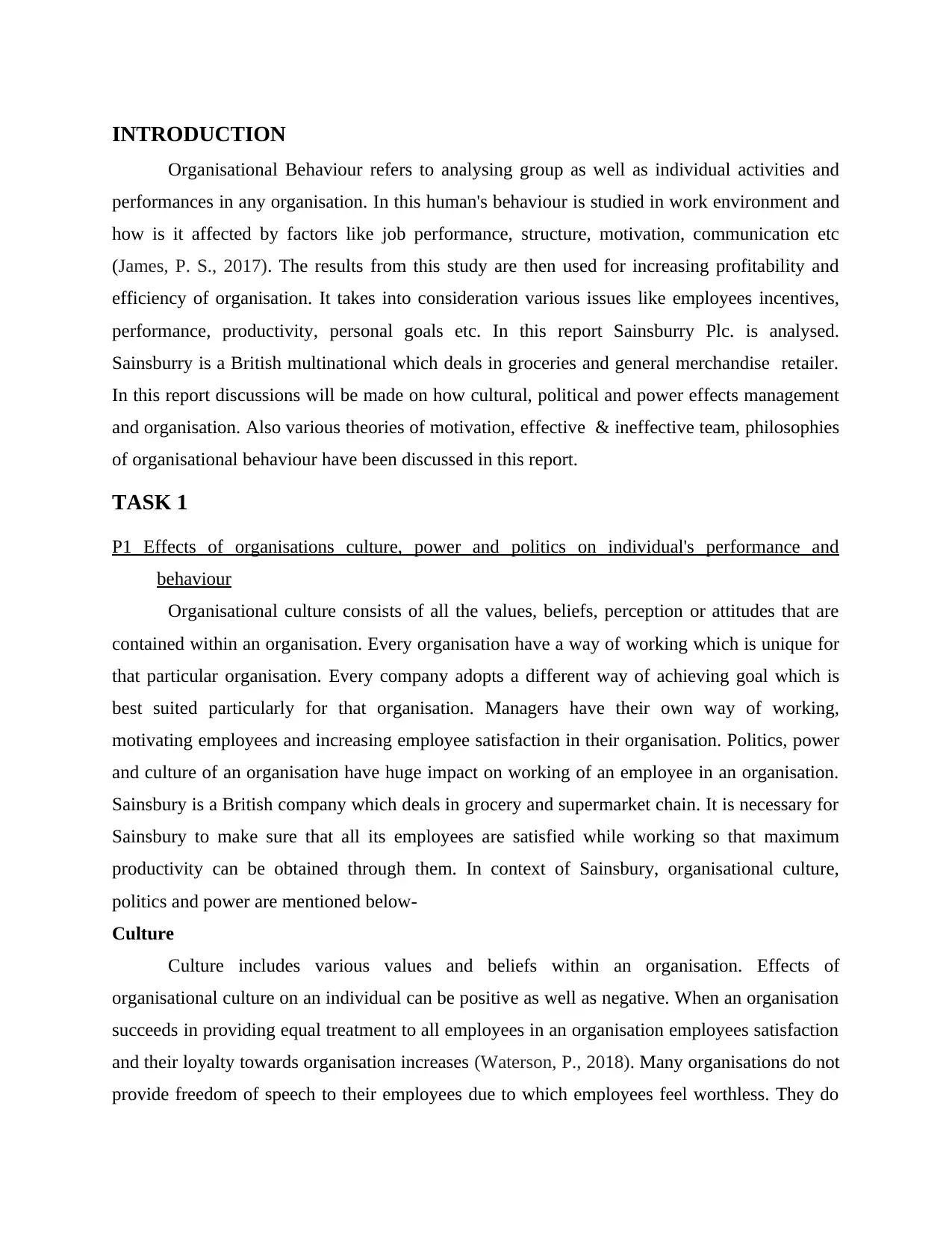
INTRODUCTION
Organisational Behaviour refers to analysing group as well as individual activities and
performances in any organisation. In this human's behaviour is studied in work environment and
how is it affected by factors like job performance, structure, motivation, communication etc
(James, P. S., 2017). The results from this study are then used for increasing profitability and
efficiency of organisation. It takes into consideration various issues like employees incentives,
performance, productivity, personal goals etc. In this report Sainsburry Plc. is analysed.
Sainsburry is a British multinational which deals in groceries and general merchandise retailer.
In this report discussions will be made on how cultural, political and power effects management
and organisation. Also various theories of motivation, effective & ineffective team, philosophies
of organisational behaviour have been discussed in this report.
TASK 1
P1 Effects of organisations culture, power and politics on individual's performance and
behaviour
Organisational culture consists of all the values, beliefs, perception or attitudes that are
contained within an organisation. Every organisation have a way of working which is unique for
that particular organisation. Every company adopts a different way of achieving goal which is
best suited particularly for that organisation. Managers have their own way of working,
motivating employees and increasing employee satisfaction in their organisation. Politics, power
and culture of an organisation have huge impact on working of an employee in an organisation.
Sainsbury is a British company which deals in grocery and supermarket chain. It is necessary for
Sainsbury to make sure that all its employees are satisfied while working so that maximum
productivity can be obtained through them. In context of Sainsbury, organisational culture,
politics and power are mentioned below-
Culture
Culture includes various values and beliefs within an organisation. Effects of
organisational culture on an individual can be positive as well as negative. When an organisation
succeeds in providing equal treatment to all employees in an organisation employees satisfaction
and their loyalty towards organisation increases (Waterson, P., 2018). Many organisations do not
provide freedom of speech to their employees due to which employees feel worthless. They do
Organisational Behaviour refers to analysing group as well as individual activities and
performances in any organisation. In this human's behaviour is studied in work environment and
how is it affected by factors like job performance, structure, motivation, communication etc
(James, P. S., 2017). The results from this study are then used for increasing profitability and
efficiency of organisation. It takes into consideration various issues like employees incentives,
performance, productivity, personal goals etc. In this report Sainsburry Plc. is analysed.
Sainsburry is a British multinational which deals in groceries and general merchandise retailer.
In this report discussions will be made on how cultural, political and power effects management
and organisation. Also various theories of motivation, effective & ineffective team, philosophies
of organisational behaviour have been discussed in this report.
TASK 1
P1 Effects of organisations culture, power and politics on individual's performance and
behaviour
Organisational culture consists of all the values, beliefs, perception or attitudes that are
contained within an organisation. Every organisation have a way of working which is unique for
that particular organisation. Every company adopts a different way of achieving goal which is
best suited particularly for that organisation. Managers have their own way of working,
motivating employees and increasing employee satisfaction in their organisation. Politics, power
and culture of an organisation have huge impact on working of an employee in an organisation.
Sainsbury is a British company which deals in grocery and supermarket chain. It is necessary for
Sainsbury to make sure that all its employees are satisfied while working so that maximum
productivity can be obtained through them. In context of Sainsbury, organisational culture,
politics and power are mentioned below-
Culture
Culture includes various values and beliefs within an organisation. Effects of
organisational culture on an individual can be positive as well as negative. When an organisation
succeeds in providing equal treatment to all employees in an organisation employees satisfaction
and their loyalty towards organisation increases (Waterson, P., 2018). Many organisations do not
provide freedom of speech to their employees due to which employees feel worthless. They do
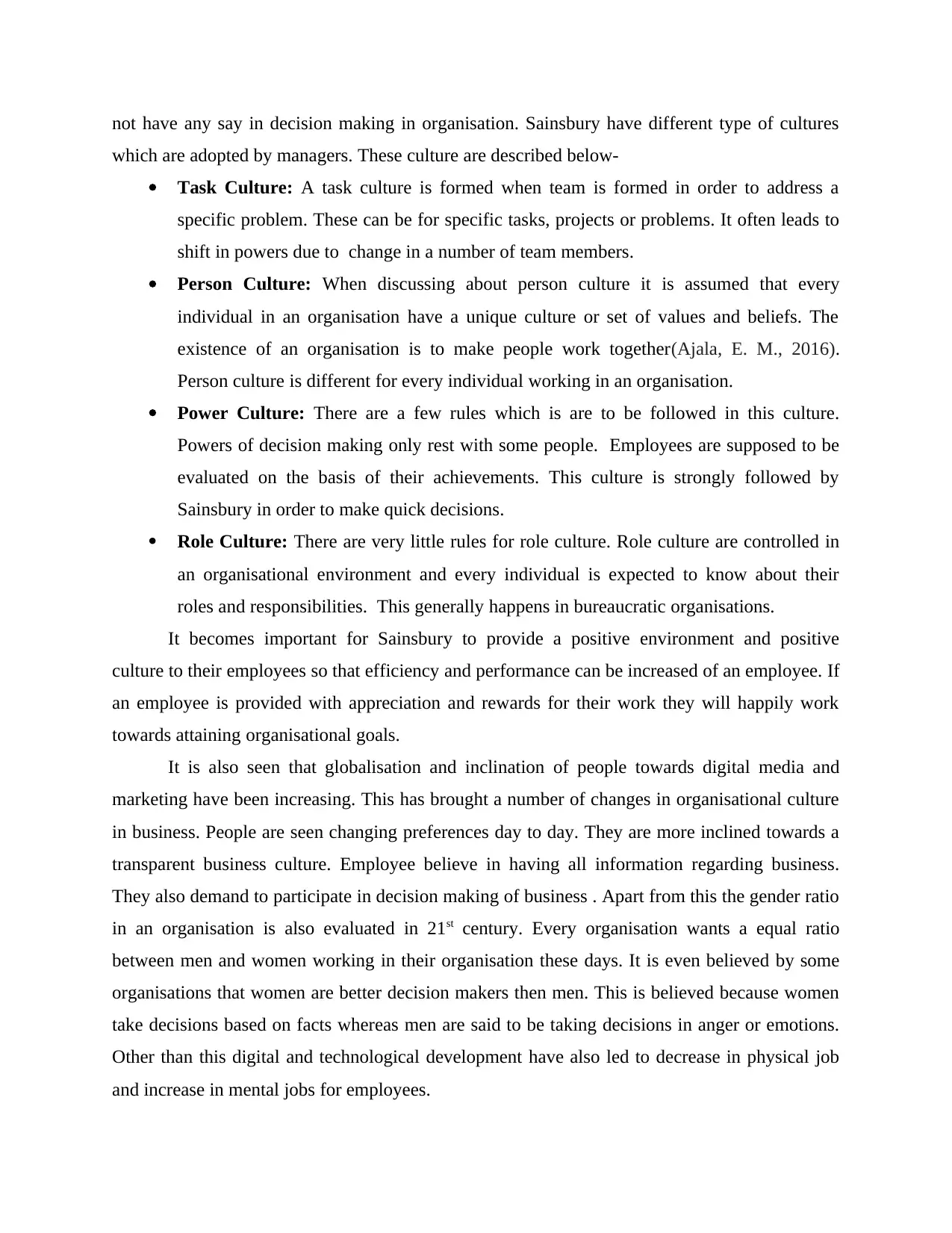
not have any say in decision making in organisation. Sainsbury have different type of cultures
which are adopted by managers. These culture are described below-
Task Culture: A task culture is formed when team is formed in order to address a
specific problem. These can be for specific tasks, projects or problems. It often leads to
shift in powers due to change in a number of team members.
Person Culture: When discussing about person culture it is assumed that every
individual in an organisation have a unique culture or set of values and beliefs. The
existence of an organisation is to make people work together(Ajala, E. M., 2016).
Person culture is different for every individual working in an organisation.
Power Culture: There are a few rules which is are to be followed in this culture.
Powers of decision making only rest with some people. Employees are supposed to be
evaluated on the basis of their achievements. This culture is strongly followed by
Sainsbury in order to make quick decisions.
Role Culture: There are very little rules for role culture. Role culture are controlled in
an organisational environment and every individual is expected to know about their
roles and responsibilities. This generally happens in bureaucratic organisations.
It becomes important for Sainsbury to provide a positive environment and positive
culture to their employees so that efficiency and performance can be increased of an employee. If
an employee is provided with appreciation and rewards for their work they will happily work
towards attaining organisational goals.
It is also seen that globalisation and inclination of people towards digital media and
marketing have been increasing. This has brought a number of changes in organisational culture
in business. People are seen changing preferences day to day. They are more inclined towards a
transparent business culture. Employee believe in having all information regarding business.
They also demand to participate in decision making of business . Apart from this the gender ratio
in an organisation is also evaluated in 21st century. Every organisation wants a equal ratio
between men and women working in their organisation these days. It is even believed by some
organisations that women are better decision makers then men. This is believed because women
take decisions based on facts whereas men are said to be taking decisions in anger or emotions.
Other than this digital and technological development have also led to decrease in physical job
and increase in mental jobs for employees.
which are adopted by managers. These culture are described below-
Task Culture: A task culture is formed when team is formed in order to address a
specific problem. These can be for specific tasks, projects or problems. It often leads to
shift in powers due to change in a number of team members.
Person Culture: When discussing about person culture it is assumed that every
individual in an organisation have a unique culture or set of values and beliefs. The
existence of an organisation is to make people work together(Ajala, E. M., 2016).
Person culture is different for every individual working in an organisation.
Power Culture: There are a few rules which is are to be followed in this culture.
Powers of decision making only rest with some people. Employees are supposed to be
evaluated on the basis of their achievements. This culture is strongly followed by
Sainsbury in order to make quick decisions.
Role Culture: There are very little rules for role culture. Role culture are controlled in
an organisational environment and every individual is expected to know about their
roles and responsibilities. This generally happens in bureaucratic organisations.
It becomes important for Sainsbury to provide a positive environment and positive
culture to their employees so that efficiency and performance can be increased of an employee. If
an employee is provided with appreciation and rewards for their work they will happily work
towards attaining organisational goals.
It is also seen that globalisation and inclination of people towards digital media and
marketing have been increasing. This has brought a number of changes in organisational culture
in business. People are seen changing preferences day to day. They are more inclined towards a
transparent business culture. Employee believe in having all information regarding business.
They also demand to participate in decision making of business . Apart from this the gender ratio
in an organisation is also evaluated in 21st century. Every organisation wants a equal ratio
between men and women working in their organisation these days. It is even believed by some
organisations that women are better decision makers then men. This is believed because women
take decisions based on facts whereas men are said to be taking decisions in anger or emotions.
Other than this digital and technological development have also led to decrease in physical job
and increase in mental jobs for employees.
Secure Best Marks with AI Grader
Need help grading? Try our AI Grader for instant feedback on your assignments.
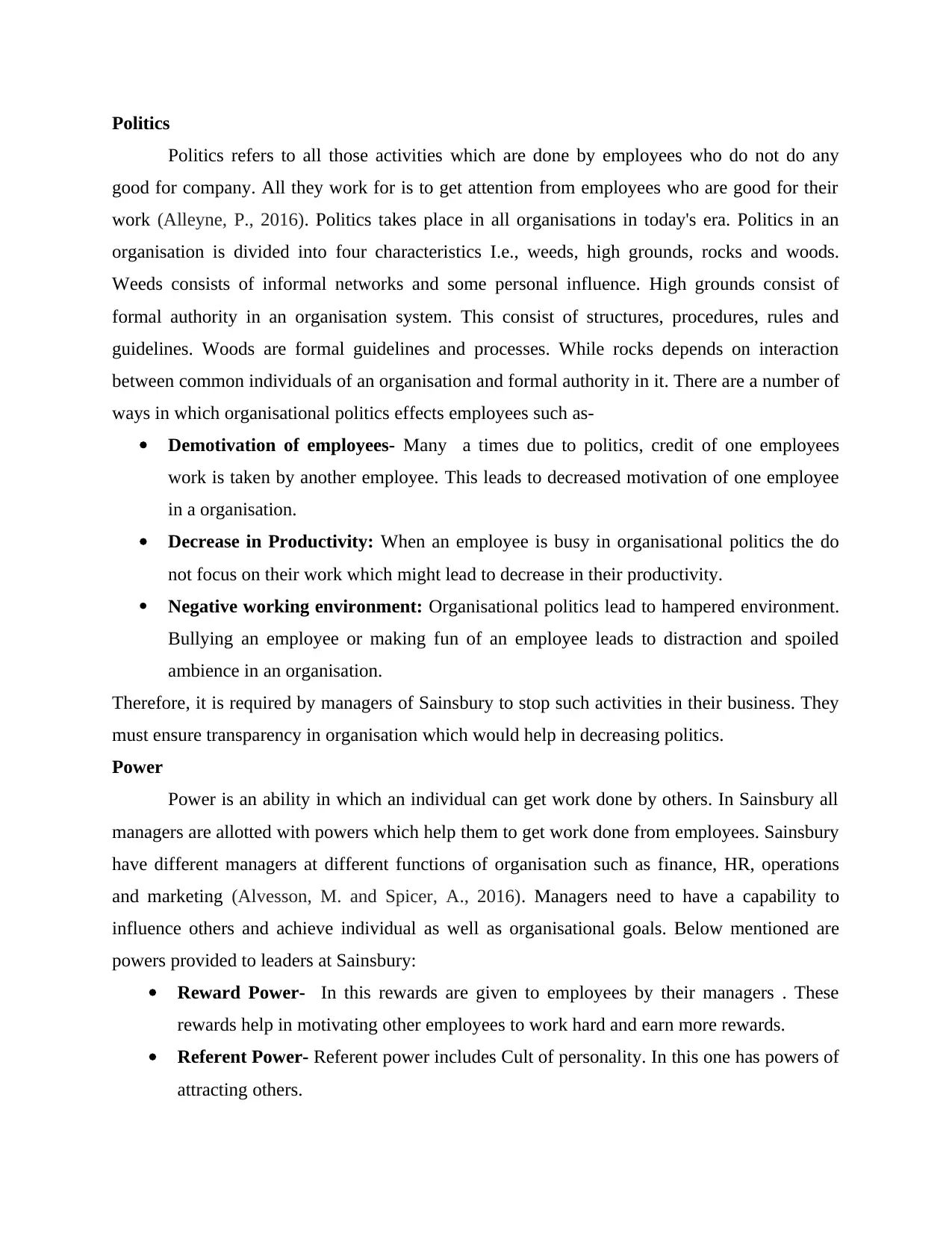
Politics
Politics refers to all those activities which are done by employees who do not do any
good for company. All they work for is to get attention from employees who are good for their
work (Alleyne, P., 2016). Politics takes place in all organisations in today's era. Politics in an
organisation is divided into four characteristics I.e., weeds, high grounds, rocks and woods.
Weeds consists of informal networks and some personal influence. High grounds consist of
formal authority in an organisation system. This consist of structures, procedures, rules and
guidelines. Woods are formal guidelines and processes. While rocks depends on interaction
between common individuals of an organisation and formal authority in it. There are a number of
ways in which organisational politics effects employees such as-
Demotivation of employees- Many a times due to politics, credit of one employees
work is taken by another employee. This leads to decreased motivation of one employee
in a organisation.
Decrease in Productivity: When an employee is busy in organisational politics the do
not focus on their work which might lead to decrease in their productivity.
Negative working environment: Organisational politics lead to hampered environment.
Bullying an employee or making fun of an employee leads to distraction and spoiled
ambience in an organisation.
Therefore, it is required by managers of Sainsbury to stop such activities in their business. They
must ensure transparency in organisation which would help in decreasing politics.
Power
Power is an ability in which an individual can get work done by others. In Sainsbury all
managers are allotted with powers which help them to get work done from employees. Sainsbury
have different managers at different functions of organisation such as finance, HR, operations
and marketing (Alvesson, M. and Spicer, A., 2016). Managers need to have a capability to
influence others and achieve individual as well as organisational goals. Below mentioned are
powers provided to leaders at Sainsbury:
Reward Power- In this rewards are given to employees by their managers . These
rewards help in motivating other employees to work hard and earn more rewards.
Referent Power- Referent power includes Cult of personality. In this one has powers of
attracting others.
Politics refers to all those activities which are done by employees who do not do any
good for company. All they work for is to get attention from employees who are good for their
work (Alleyne, P., 2016). Politics takes place in all organisations in today's era. Politics in an
organisation is divided into four characteristics I.e., weeds, high grounds, rocks and woods.
Weeds consists of informal networks and some personal influence. High grounds consist of
formal authority in an organisation system. This consist of structures, procedures, rules and
guidelines. Woods are formal guidelines and processes. While rocks depends on interaction
between common individuals of an organisation and formal authority in it. There are a number of
ways in which organisational politics effects employees such as-
Demotivation of employees- Many a times due to politics, credit of one employees
work is taken by another employee. This leads to decreased motivation of one employee
in a organisation.
Decrease in Productivity: When an employee is busy in organisational politics the do
not focus on their work which might lead to decrease in their productivity.
Negative working environment: Organisational politics lead to hampered environment.
Bullying an employee or making fun of an employee leads to distraction and spoiled
ambience in an organisation.
Therefore, it is required by managers of Sainsbury to stop such activities in their business. They
must ensure transparency in organisation which would help in decreasing politics.
Power
Power is an ability in which an individual can get work done by others. In Sainsbury all
managers are allotted with powers which help them to get work done from employees. Sainsbury
have different managers at different functions of organisation such as finance, HR, operations
and marketing (Alvesson, M. and Spicer, A., 2016). Managers need to have a capability to
influence others and achieve individual as well as organisational goals. Below mentioned are
powers provided to leaders at Sainsbury:
Reward Power- In this rewards are given to employees by their managers . These
rewards help in motivating other employees to work hard and earn more rewards.
Referent Power- Referent power includes Cult of personality. In this one has powers of
attracting others.
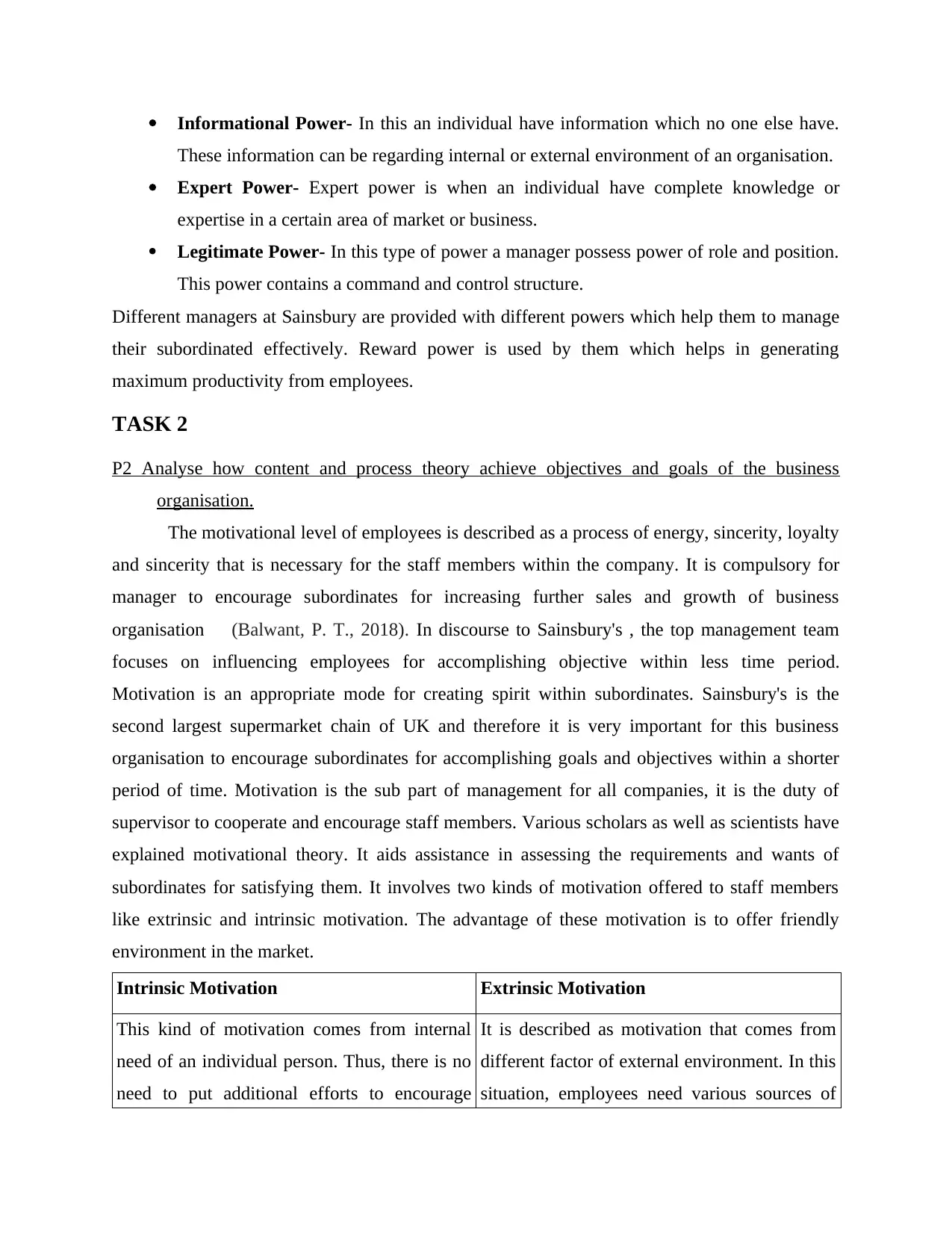
Informational Power- In this an individual have information which no one else have.
These information can be regarding internal or external environment of an organisation.
Expert Power- Expert power is when an individual have complete knowledge or
expertise in a certain area of market or business.
Legitimate Power- In this type of power a manager possess power of role and position.
This power contains a command and control structure.
Different managers at Sainsbury are provided with different powers which help them to manage
their subordinated effectively. Reward power is used by them which helps in generating
maximum productivity from employees.
TASK 2
P2 Analyse how content and process theory achieve objectives and goals of the business
organisation.
The motivational level of employees is described as a process of energy, sincerity, loyalty
and sincerity that is necessary for the staff members within the company. It is compulsory for
manager to encourage subordinates for increasing further sales and growth of business
organisation (Balwant, P. T., 2018). In discourse to Sainsbury's , the top management team
focuses on influencing employees for accomplishing objective within less time period.
Motivation is an appropriate mode for creating spirit within subordinates. Sainsbury's is the
second largest supermarket chain of UK and therefore it is very important for this business
organisation to encourage subordinates for accomplishing goals and objectives within a shorter
period of time. Motivation is the sub part of management for all companies, it is the duty of
supervisor to cooperate and encourage staff members. Various scholars as well as scientists have
explained motivational theory. It aids assistance in assessing the requirements and wants of
subordinates for satisfying them. It involves two kinds of motivation offered to staff members
like extrinsic and intrinsic motivation. The advantage of these motivation is to offer friendly
environment in the market.
Intrinsic Motivation Extrinsic Motivation
This kind of motivation comes from internal
need of an individual person. Thus, there is no
need to put additional efforts to encourage
It is described as motivation that comes from
different factor of external environment. In this
situation, employees need various sources of
These information can be regarding internal or external environment of an organisation.
Expert Power- Expert power is when an individual have complete knowledge or
expertise in a certain area of market or business.
Legitimate Power- In this type of power a manager possess power of role and position.
This power contains a command and control structure.
Different managers at Sainsbury are provided with different powers which help them to manage
their subordinated effectively. Reward power is used by them which helps in generating
maximum productivity from employees.
TASK 2
P2 Analyse how content and process theory achieve objectives and goals of the business
organisation.
The motivational level of employees is described as a process of energy, sincerity, loyalty
and sincerity that is necessary for the staff members within the company. It is compulsory for
manager to encourage subordinates for increasing further sales and growth of business
organisation (Balwant, P. T., 2018). In discourse to Sainsbury's , the top management team
focuses on influencing employees for accomplishing objective within less time period.
Motivation is an appropriate mode for creating spirit within subordinates. Sainsbury's is the
second largest supermarket chain of UK and therefore it is very important for this business
organisation to encourage subordinates for accomplishing goals and objectives within a shorter
period of time. Motivation is the sub part of management for all companies, it is the duty of
supervisor to cooperate and encourage staff members. Various scholars as well as scientists have
explained motivational theory. It aids assistance in assessing the requirements and wants of
subordinates for satisfying them. It involves two kinds of motivation offered to staff members
like extrinsic and intrinsic motivation. The advantage of these motivation is to offer friendly
environment in the market.
Intrinsic Motivation Extrinsic Motivation
This kind of motivation comes from internal
need of an individual person. Thus, there is no
need to put additional efforts to encourage
It is described as motivation that comes from
different factor of external environment. In this
situation, employees need various sources of
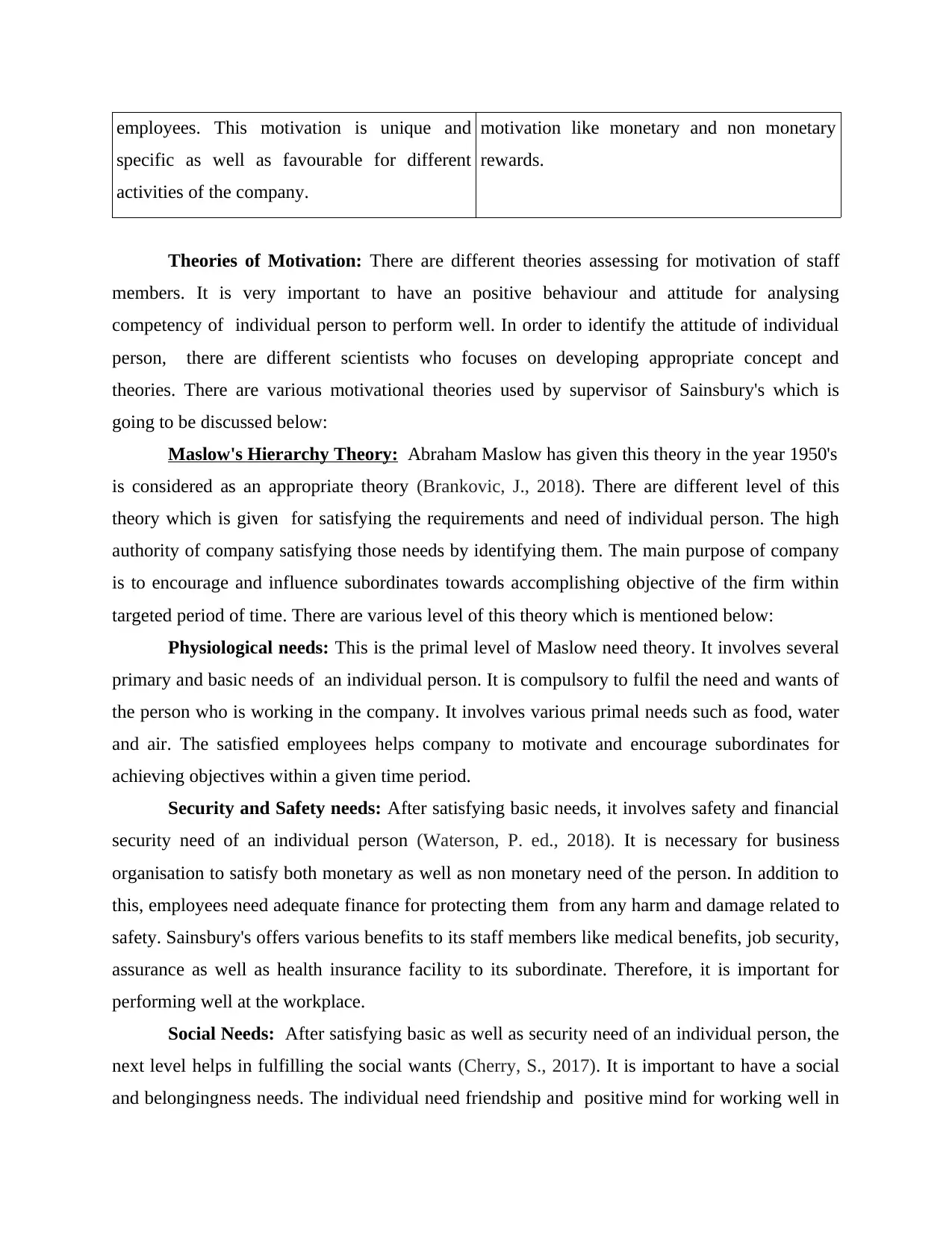
employees. This motivation is unique and
specific as well as favourable for different
activities of the company.
motivation like monetary and non monetary
rewards.
Theories of Motivation: There are different theories assessing for motivation of staff
members. It is very important to have an positive behaviour and attitude for analysing
competency of individual person to perform well. In order to identify the attitude of individual
person, there are different scientists who focuses on developing appropriate concept and
theories. There are various motivational theories used by supervisor of Sainsbury's which is
going to be discussed below:
Maslow's Hierarchy Theory: Abraham Maslow has given this theory in the year 1950's
is considered as an appropriate theory (Brankovic, J., 2018). There are different level of this
theory which is given for satisfying the requirements and need of individual person. The high
authority of company satisfying those needs by identifying them. The main purpose of company
is to encourage and influence subordinates towards accomplishing objective of the firm within
targeted period of time. There are various level of this theory which is mentioned below:
Physiological needs: This is the primal level of Maslow need theory. It involves several
primary and basic needs of an individual person. It is compulsory to fulfil the need and wants of
the person who is working in the company. It involves various primal needs such as food, water
and air. The satisfied employees helps company to motivate and encourage subordinates for
achieving objectives within a given time period.
Security and Safety needs: After satisfying basic needs, it involves safety and financial
security need of an individual person (Waterson, P. ed., 2018). It is necessary for business
organisation to satisfy both monetary as well as non monetary need of the person. In addition to
this, employees need adequate finance for protecting them from any harm and damage related to
safety. Sainsbury's offers various benefits to its staff members like medical benefits, job security,
assurance as well as health insurance facility to its subordinate. Therefore, it is important for
performing well at the workplace.
Social Needs: After satisfying basic as well as security need of an individual person, the
next level helps in fulfilling the social wants (Cherry, S., 2017). It is important to have a social
and belongingness needs. The individual need friendship and positive mind for working well in
specific as well as favourable for different
activities of the company.
motivation like monetary and non monetary
rewards.
Theories of Motivation: There are different theories assessing for motivation of staff
members. It is very important to have an positive behaviour and attitude for analysing
competency of individual person to perform well. In order to identify the attitude of individual
person, there are different scientists who focuses on developing appropriate concept and
theories. There are various motivational theories used by supervisor of Sainsbury's which is
going to be discussed below:
Maslow's Hierarchy Theory: Abraham Maslow has given this theory in the year 1950's
is considered as an appropriate theory (Brankovic, J., 2018). There are different level of this
theory which is given for satisfying the requirements and need of individual person. The high
authority of company satisfying those needs by identifying them. The main purpose of company
is to encourage and influence subordinates towards accomplishing objective of the firm within
targeted period of time. There are various level of this theory which is mentioned below:
Physiological needs: This is the primal level of Maslow need theory. It involves several
primary and basic needs of an individual person. It is compulsory to fulfil the need and wants of
the person who is working in the company. It involves various primal needs such as food, water
and air. The satisfied employees helps company to motivate and encourage subordinates for
achieving objectives within a given time period.
Security and Safety needs: After satisfying basic needs, it involves safety and financial
security need of an individual person (Waterson, P. ed., 2018). It is necessary for business
organisation to satisfy both monetary as well as non monetary need of the person. In addition to
this, employees need adequate finance for protecting them from any harm and damage related to
safety. Sainsbury's offers various benefits to its staff members like medical benefits, job security,
assurance as well as health insurance facility to its subordinate. Therefore, it is important for
performing well at the workplace.
Social Needs: After satisfying basic as well as security need of an individual person, the
next level helps in fulfilling the social wants (Cherry, S., 2017). It is important to have a social
and belongingness needs. The individual need friendship and positive mind for working well in
Paraphrase This Document
Need a fresh take? Get an instant paraphrase of this document with our AI Paraphraser
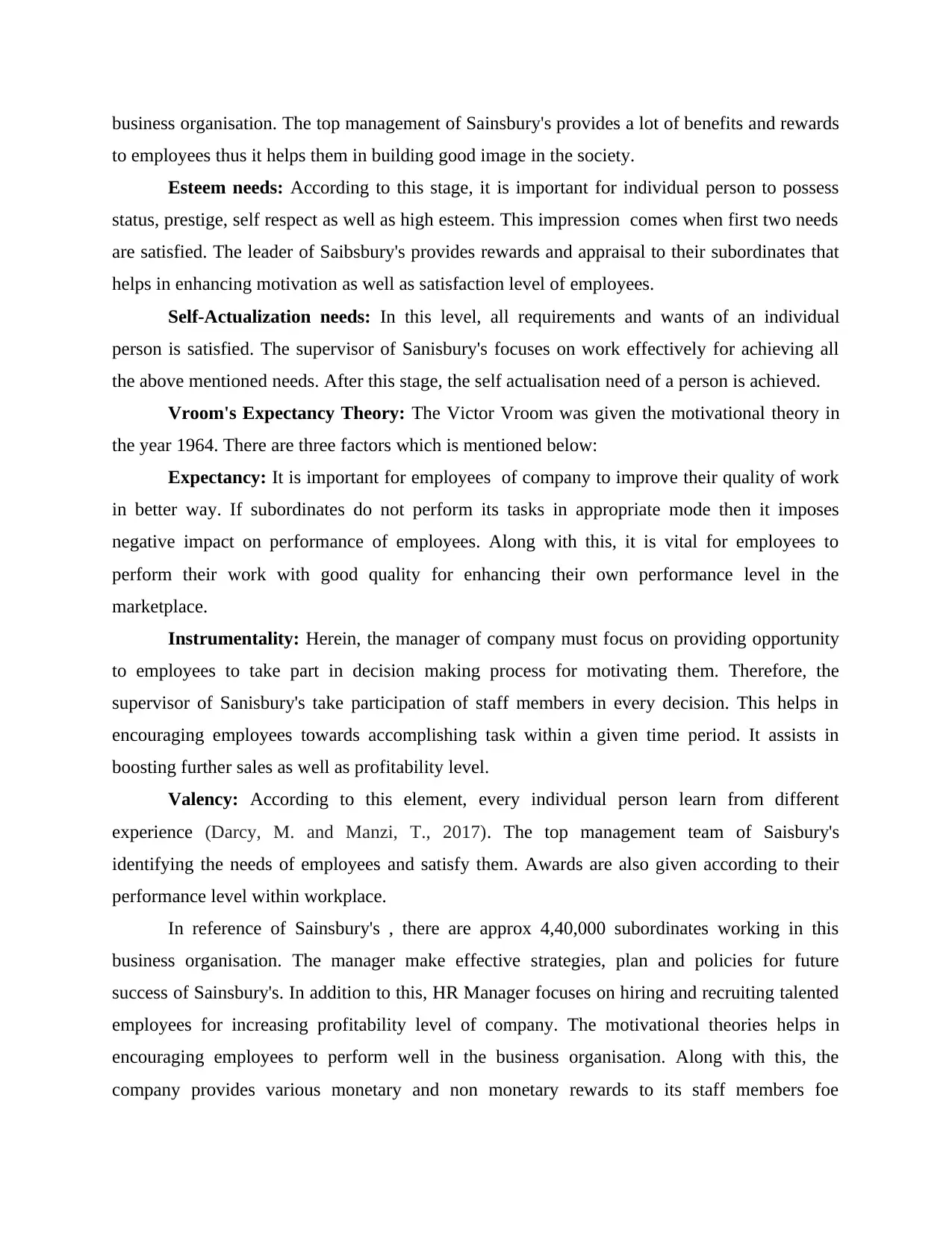
business organisation. The top management of Sainsbury's provides a lot of benefits and rewards
to employees thus it helps them in building good image in the society.
Esteem needs: According to this stage, it is important for individual person to possess
status, prestige, self respect as well as high esteem. This impression comes when first two needs
are satisfied. The leader of Saibsbury's provides rewards and appraisal to their subordinates that
helps in enhancing motivation as well as satisfaction level of employees.
Self-Actualization needs: In this level, all requirements and wants of an individual
person is satisfied. The supervisor of Sanisbury's focuses on work effectively for achieving all
the above mentioned needs. After this stage, the self actualisation need of a person is achieved.
Vroom's Expectancy Theory: The Victor Vroom was given the motivational theory in
the year 1964. There are three factors which is mentioned below:
Expectancy: It is important for employees of company to improve their quality of work
in better way. If subordinates do not perform its tasks in appropriate mode then it imposes
negative impact on performance of employees. Along with this, it is vital for employees to
perform their work with good quality for enhancing their own performance level in the
marketplace.
Instrumentality: Herein, the manager of company must focus on providing opportunity
to employees to take part in decision making process for motivating them. Therefore, the
supervisor of Sanisbury's take participation of staff members in every decision. This helps in
encouraging employees towards accomplishing task within a given time period. It assists in
boosting further sales as well as profitability level.
Valency: According to this element, every individual person learn from different
experience (Darcy, M. and Manzi, T., 2017). The top management team of Saisbury's
identifying the needs of employees and satisfy them. Awards are also given according to their
performance level within workplace.
In reference of Sainsbury's , there are approx 4,40,000 subordinates working in this
business organisation. The manager make effective strategies, plan and policies for future
success of Sainsbury's. In addition to this, HR Manager focuses on hiring and recruiting talented
employees for increasing profitability level of company. The motivational theories helps in
encouraging employees to perform well in the business organisation. Along with this, the
company provides various monetary and non monetary rewards to its staff members foe
to employees thus it helps them in building good image in the society.
Esteem needs: According to this stage, it is important for individual person to possess
status, prestige, self respect as well as high esteem. This impression comes when first two needs
are satisfied. The leader of Saibsbury's provides rewards and appraisal to their subordinates that
helps in enhancing motivation as well as satisfaction level of employees.
Self-Actualization needs: In this level, all requirements and wants of an individual
person is satisfied. The supervisor of Sanisbury's focuses on work effectively for achieving all
the above mentioned needs. After this stage, the self actualisation need of a person is achieved.
Vroom's Expectancy Theory: The Victor Vroom was given the motivational theory in
the year 1964. There are three factors which is mentioned below:
Expectancy: It is important for employees of company to improve their quality of work
in better way. If subordinates do not perform its tasks in appropriate mode then it imposes
negative impact on performance of employees. Along with this, it is vital for employees to
perform their work with good quality for enhancing their own performance level in the
marketplace.
Instrumentality: Herein, the manager of company must focus on providing opportunity
to employees to take part in decision making process for motivating them. Therefore, the
supervisor of Sanisbury's take participation of staff members in every decision. This helps in
encouraging employees towards accomplishing task within a given time period. It assists in
boosting further sales as well as profitability level.
Valency: According to this element, every individual person learn from different
experience (Darcy, M. and Manzi, T., 2017). The top management team of Saisbury's
identifying the needs of employees and satisfy them. Awards are also given according to their
performance level within workplace.
In reference of Sainsbury's , there are approx 4,40,000 subordinates working in this
business organisation. The manager make effective strategies, plan and policies for future
success of Sainsbury's. In addition to this, HR Manager focuses on hiring and recruiting talented
employees for increasing profitability level of company. The motivational theories helps in
encouraging employees to perform well in the business organisation. Along with this, the
company provides various monetary and non monetary rewards to its staff members foe
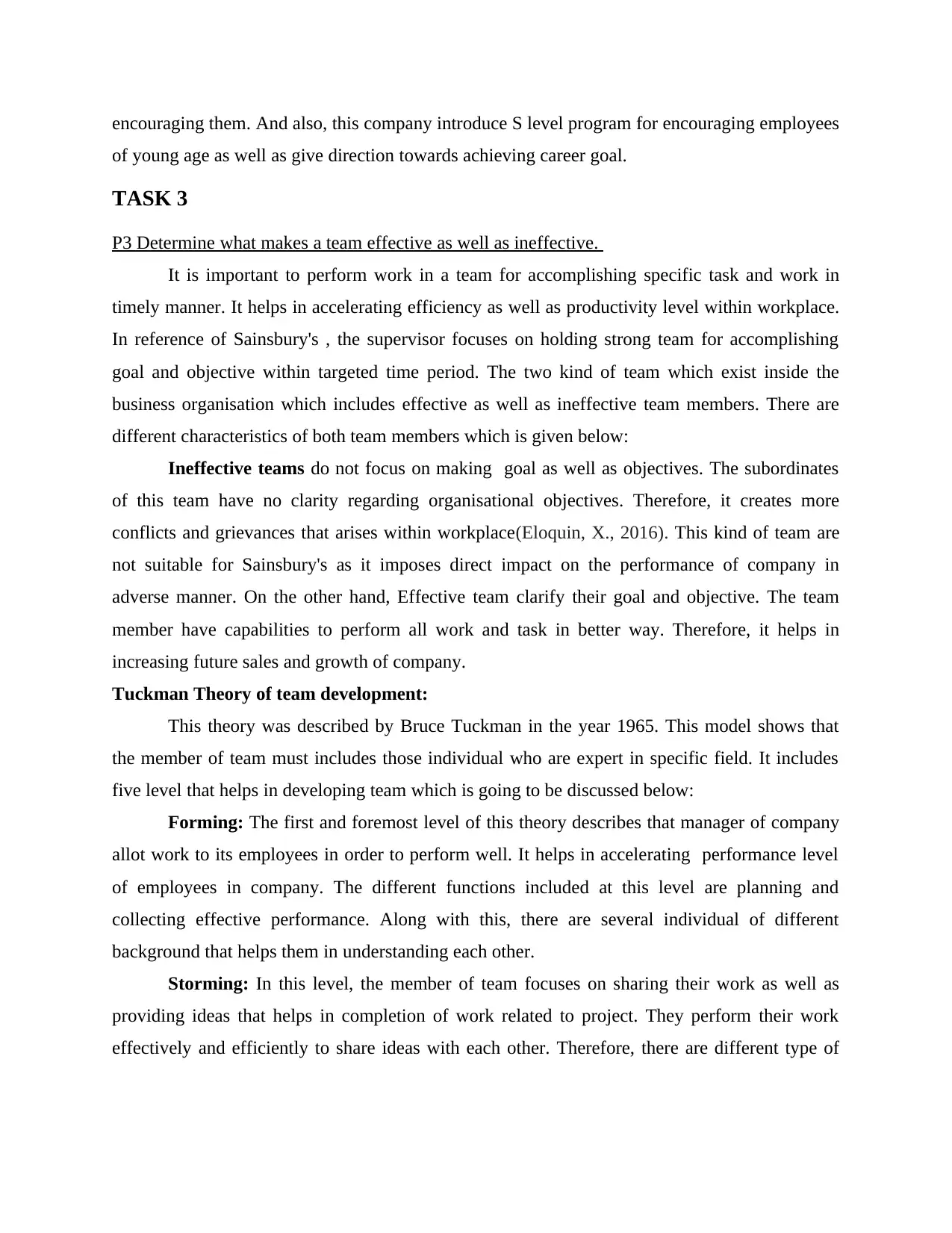
encouraging them. And also, this company introduce S level program for encouraging employees
of young age as well as give direction towards achieving career goal.
TASK 3
P3 Determine what makes a team effective as well as ineffective.
It is important to perform work in a team for accomplishing specific task and work in
timely manner. It helps in accelerating efficiency as well as productivity level within workplace.
In reference of Sainsbury's , the supervisor focuses on holding strong team for accomplishing
goal and objective within targeted time period. The two kind of team which exist inside the
business organisation which includes effective as well as ineffective team members. There are
different characteristics of both team members which is given below:
Ineffective teams do not focus on making goal as well as objectives. The subordinates
of this team have no clarity regarding organisational objectives. Therefore, it creates more
conflicts and grievances that arises within workplace(Eloquin, X., 2016). This kind of team are
not suitable for Sainsbury's as it imposes direct impact on the performance of company in
adverse manner. On the other hand, Effective team clarify their goal and objective. The team
member have capabilities to perform all work and task in better way. Therefore, it helps in
increasing future sales and growth of company.
Tuckman Theory of team development:
This theory was described by Bruce Tuckman in the year 1965. This model shows that
the member of team must includes those individual who are expert in specific field. It includes
five level that helps in developing team which is going to be discussed below:
Forming: The first and foremost level of this theory describes that manager of company
allot work to its employees in order to perform well. It helps in accelerating performance level
of employees in company. The different functions included at this level are planning and
collecting effective performance. Along with this, there are several individual of different
background that helps them in understanding each other.
Storming: In this level, the member of team focuses on sharing their work as well as
providing ideas that helps in completion of work related to project. They perform their work
effectively and efficiently to share ideas with each other. Therefore, there are different type of
of young age as well as give direction towards achieving career goal.
TASK 3
P3 Determine what makes a team effective as well as ineffective.
It is important to perform work in a team for accomplishing specific task and work in
timely manner. It helps in accelerating efficiency as well as productivity level within workplace.
In reference of Sainsbury's , the supervisor focuses on holding strong team for accomplishing
goal and objective within targeted time period. The two kind of team which exist inside the
business organisation which includes effective as well as ineffective team members. There are
different characteristics of both team members which is given below:
Ineffective teams do not focus on making goal as well as objectives. The subordinates
of this team have no clarity regarding organisational objectives. Therefore, it creates more
conflicts and grievances that arises within workplace(Eloquin, X., 2016). This kind of team are
not suitable for Sainsbury's as it imposes direct impact on the performance of company in
adverse manner. On the other hand, Effective team clarify their goal and objective. The team
member have capabilities to perform all work and task in better way. Therefore, it helps in
increasing future sales and growth of company.
Tuckman Theory of team development:
This theory was described by Bruce Tuckman in the year 1965. This model shows that
the member of team must includes those individual who are expert in specific field. It includes
five level that helps in developing team which is going to be discussed below:
Forming: The first and foremost level of this theory describes that manager of company
allot work to its employees in order to perform well. It helps in accelerating performance level
of employees in company. The different functions included at this level are planning and
collecting effective performance. Along with this, there are several individual of different
background that helps them in understanding each other.
Storming: In this level, the member of team focuses on sharing their work as well as
providing ideas that helps in completion of work related to project. They perform their work
effectively and efficiently to share ideas with each other. Therefore, there are different type of
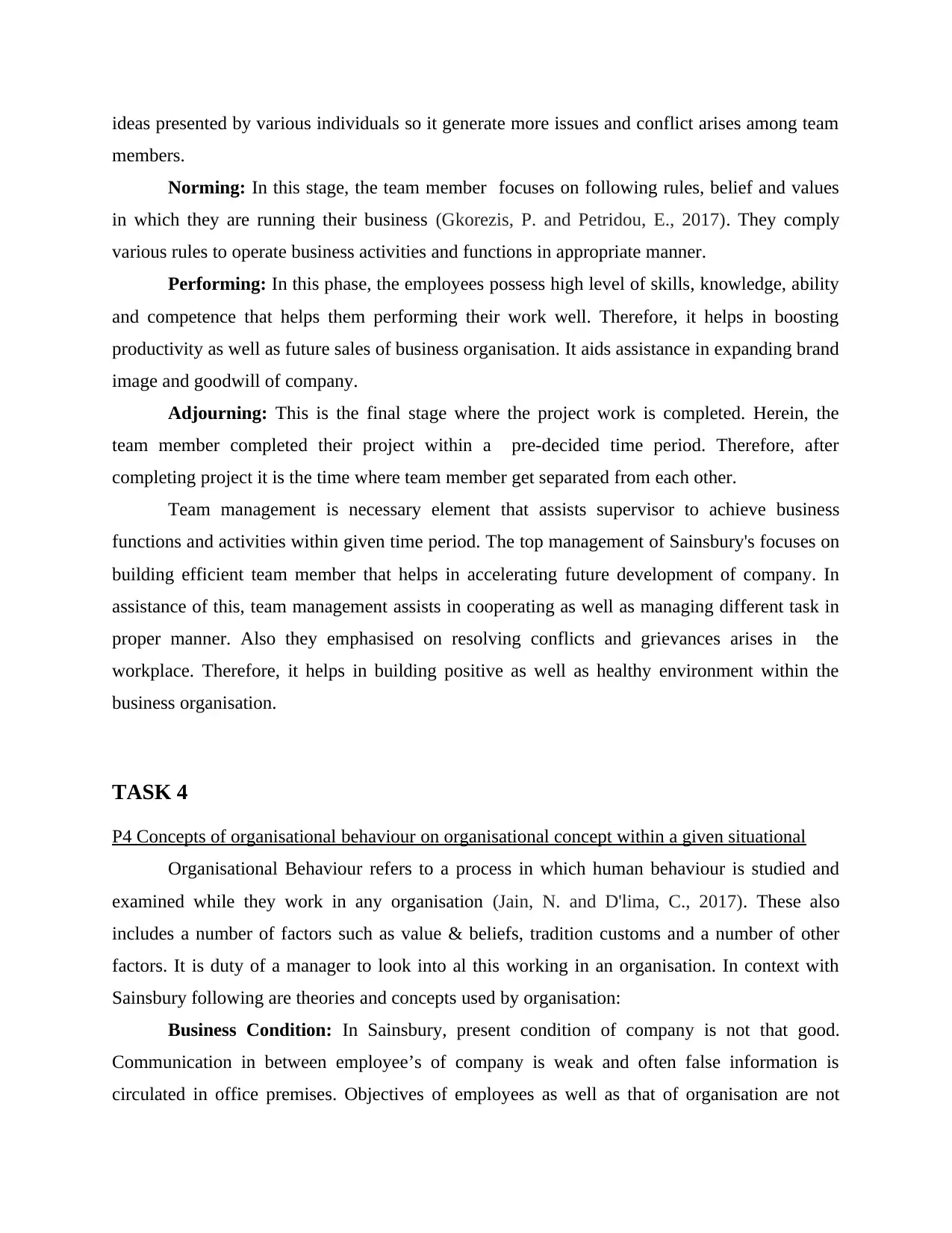
ideas presented by various individuals so it generate more issues and conflict arises among team
members.
Norming: In this stage, the team member focuses on following rules, belief and values
in which they are running their business (Gkorezis, P. and Petridou, E., 2017). They comply
various rules to operate business activities and functions in appropriate manner.
Performing: In this phase, the employees possess high level of skills, knowledge, ability
and competence that helps them performing their work well. Therefore, it helps in boosting
productivity as well as future sales of business organisation. It aids assistance in expanding brand
image and goodwill of company.
Adjourning: This is the final stage where the project work is completed. Herein, the
team member completed their project within a pre-decided time period. Therefore, after
completing project it is the time where team member get separated from each other.
Team management is necessary element that assists supervisor to achieve business
functions and activities within given time period. The top management of Sainsbury's focuses on
building efficient team member that helps in accelerating future development of company. In
assistance of this, team management assists in cooperating as well as managing different task in
proper manner. Also they emphasised on resolving conflicts and grievances arises in the
workplace. Therefore, it helps in building positive as well as healthy environment within the
business organisation.
TASK 4
P4 Concepts of organisational behaviour on organisational concept within a given situational
Organisational Behaviour refers to a process in which human behaviour is studied and
examined while they work in any organisation (Jain, N. and D'lima, C., 2017). These also
includes a number of factors such as value & beliefs, tradition customs and a number of other
factors. It is duty of a manager to look into al this working in an organisation. In context with
Sainsbury following are theories and concepts used by organisation:
Business Condition: In Sainsbury, present condition of company is not that good.
Communication in between employee’s of company is weak and often false information is
circulated in office premises. Objectives of employees as well as that of organisation are not
members.
Norming: In this stage, the team member focuses on following rules, belief and values
in which they are running their business (Gkorezis, P. and Petridou, E., 2017). They comply
various rules to operate business activities and functions in appropriate manner.
Performing: In this phase, the employees possess high level of skills, knowledge, ability
and competence that helps them performing their work well. Therefore, it helps in boosting
productivity as well as future sales of business organisation. It aids assistance in expanding brand
image and goodwill of company.
Adjourning: This is the final stage where the project work is completed. Herein, the
team member completed their project within a pre-decided time period. Therefore, after
completing project it is the time where team member get separated from each other.
Team management is necessary element that assists supervisor to achieve business
functions and activities within given time period. The top management of Sainsbury's focuses on
building efficient team member that helps in accelerating future development of company. In
assistance of this, team management assists in cooperating as well as managing different task in
proper manner. Also they emphasised on resolving conflicts and grievances arises in the
workplace. Therefore, it helps in building positive as well as healthy environment within the
business organisation.
TASK 4
P4 Concepts of organisational behaviour on organisational concept within a given situational
Organisational Behaviour refers to a process in which human behaviour is studied and
examined while they work in any organisation (Jain, N. and D'lima, C., 2017). These also
includes a number of factors such as value & beliefs, tradition customs and a number of other
factors. It is duty of a manager to look into al this working in an organisation. In context with
Sainsbury following are theories and concepts used by organisation:
Business Condition: In Sainsbury, present condition of company is not that good.
Communication in between employee’s of company is weak and often false information is
circulated in office premises. Objectives of employees as well as that of organisation are not
Secure Best Marks with AI Grader
Need help grading? Try our AI Grader for instant feedback on your assignments.
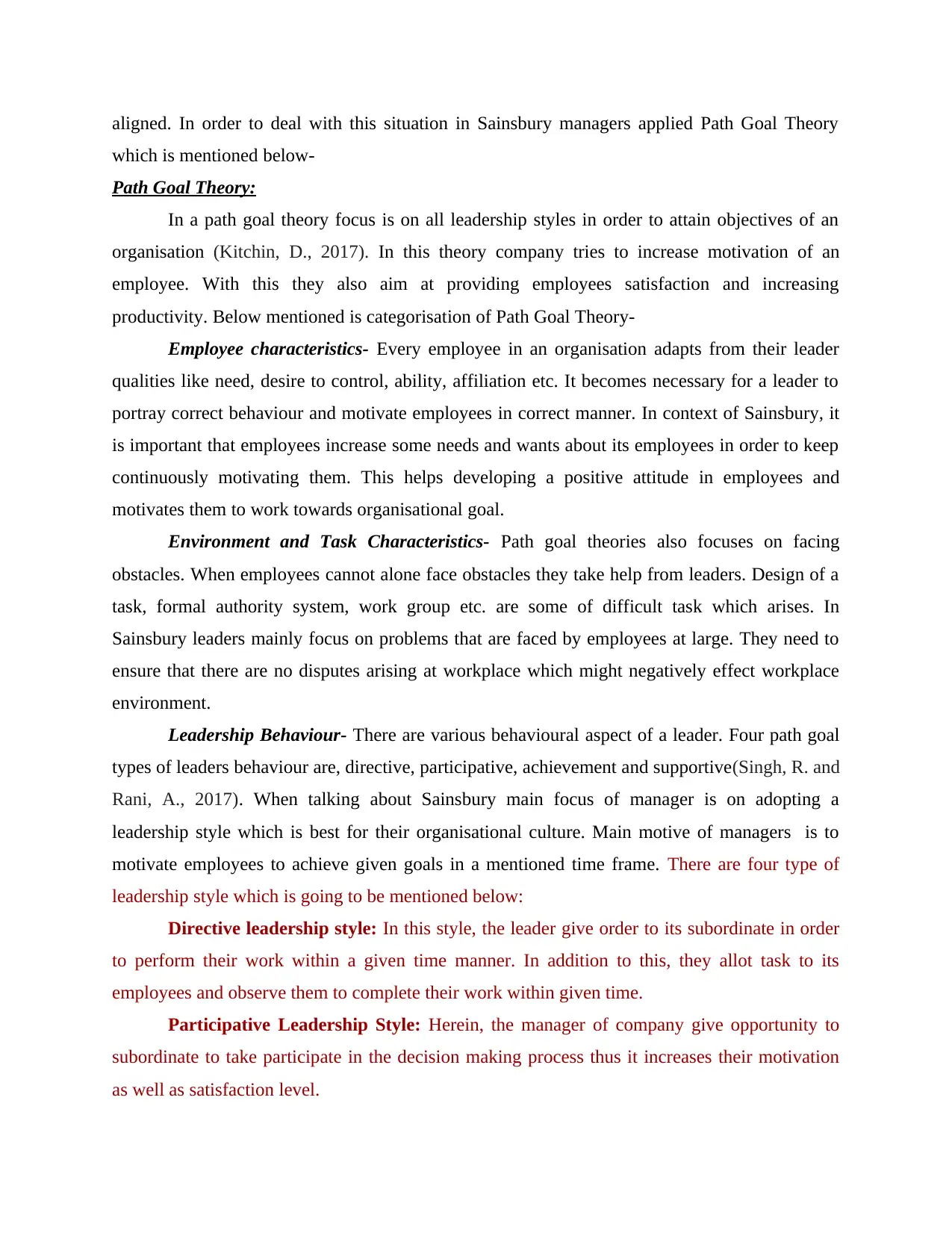
aligned. In order to deal with this situation in Sainsbury managers applied Path Goal Theory
which is mentioned below-
Path Goal Theory:
In a path goal theory focus is on all leadership styles in order to attain objectives of an
organisation (Kitchin, D., 2017). In this theory company tries to increase motivation of an
employee. With this they also aim at providing employees satisfaction and increasing
productivity. Below mentioned is categorisation of Path Goal Theory-
Employee characteristics- Every employee in an organisation adapts from their leader
qualities like need, desire to control, ability, affiliation etc. It becomes necessary for a leader to
portray correct behaviour and motivate employees in correct manner. In context of Sainsbury, it
is important that employees increase some needs and wants about its employees in order to keep
continuously motivating them. This helps developing a positive attitude in employees and
motivates them to work towards organisational goal.
Environment and Task Characteristics- Path goal theories also focuses on facing
obstacles. When employees cannot alone face obstacles they take help from leaders. Design of a
task, formal authority system, work group etc. are some of difficult task which arises. In
Sainsbury leaders mainly focus on problems that are faced by employees at large. They need to
ensure that there are no disputes arising at workplace which might negatively effect workplace
environment.
Leadership Behaviour- There are various behavioural aspect of a leader. Four path goal
types of leaders behaviour are, directive, participative, achievement and supportive(Singh, R. and
Rani, A., 2017). When talking about Sainsbury main focus of manager is on adopting a
leadership style which is best for their organisational culture. Main motive of managers is to
motivate employees to achieve given goals in a mentioned time frame. There are four type of
leadership style which is going to be mentioned below:
Directive leadership style: In this style, the leader give order to its subordinate in order
to perform their work within a given time manner. In addition to this, they allot task to its
employees and observe them to complete their work within given time.
Participative Leadership Style: Herein, the manager of company give opportunity to
subordinate to take participate in the decision making process thus it increases their motivation
as well as satisfaction level.
which is mentioned below-
Path Goal Theory:
In a path goal theory focus is on all leadership styles in order to attain objectives of an
organisation (Kitchin, D., 2017). In this theory company tries to increase motivation of an
employee. With this they also aim at providing employees satisfaction and increasing
productivity. Below mentioned is categorisation of Path Goal Theory-
Employee characteristics- Every employee in an organisation adapts from their leader
qualities like need, desire to control, ability, affiliation etc. It becomes necessary for a leader to
portray correct behaviour and motivate employees in correct manner. In context of Sainsbury, it
is important that employees increase some needs and wants about its employees in order to keep
continuously motivating them. This helps developing a positive attitude in employees and
motivates them to work towards organisational goal.
Environment and Task Characteristics- Path goal theories also focuses on facing
obstacles. When employees cannot alone face obstacles they take help from leaders. Design of a
task, formal authority system, work group etc. are some of difficult task which arises. In
Sainsbury leaders mainly focus on problems that are faced by employees at large. They need to
ensure that there are no disputes arising at workplace which might negatively effect workplace
environment.
Leadership Behaviour- There are various behavioural aspect of a leader. Four path goal
types of leaders behaviour are, directive, participative, achievement and supportive(Singh, R. and
Rani, A., 2017). When talking about Sainsbury main focus of manager is on adopting a
leadership style which is best for their organisational culture. Main motive of managers is to
motivate employees to achieve given goals in a mentioned time frame. There are four type of
leadership style which is going to be mentioned below:
Directive leadership style: In this style, the leader give order to its subordinate in order
to perform their work within a given time manner. In addition to this, they allot task to its
employees and observe them to complete their work within given time.
Participative Leadership Style: Herein, the manager of company give opportunity to
subordinate to take participate in the decision making process thus it increases their motivation
as well as satisfaction level.
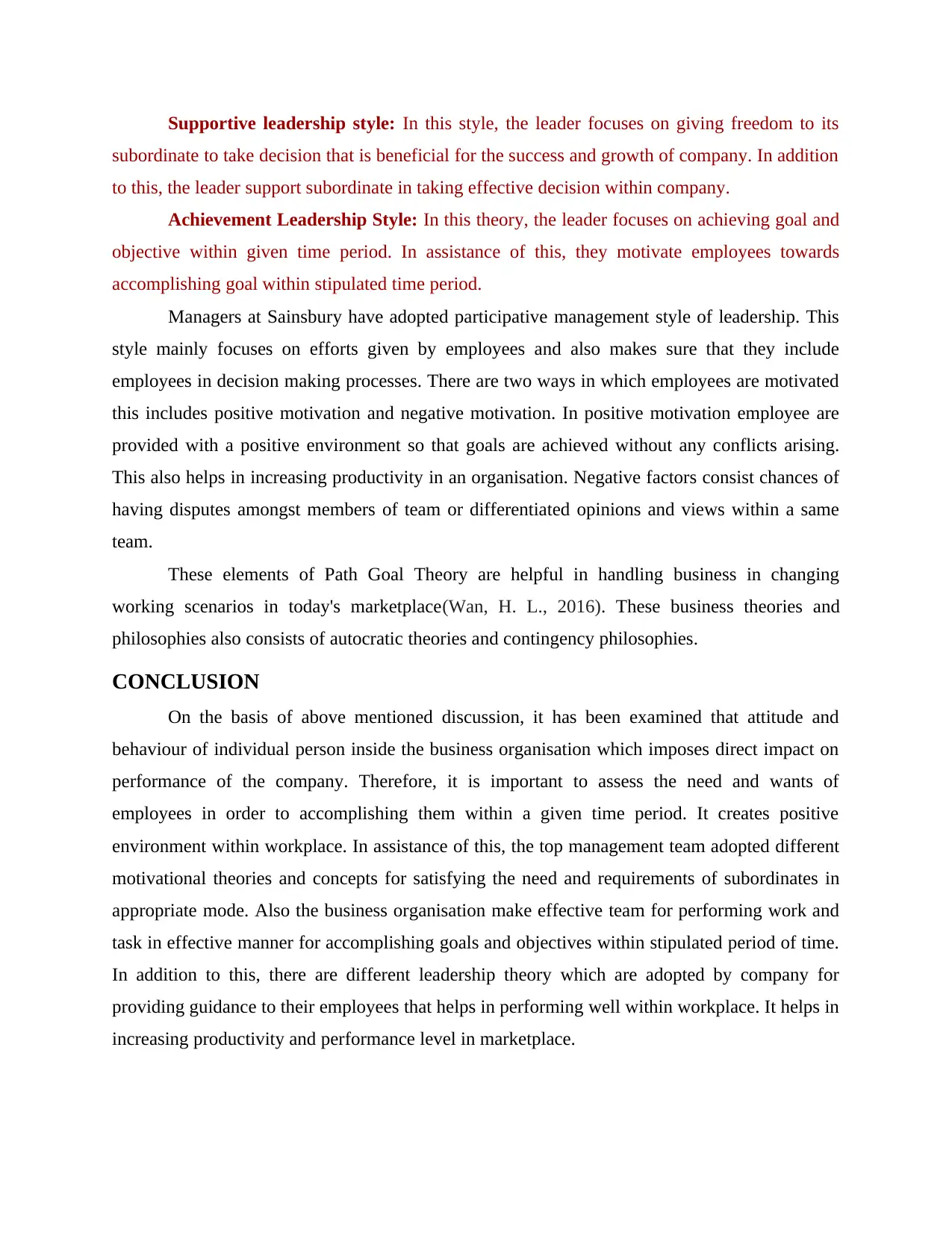
Supportive leadership style: In this style, the leader focuses on giving freedom to its
subordinate to take decision that is beneficial for the success and growth of company. In addition
to this, the leader support subordinate in taking effective decision within company.
Achievement Leadership Style: In this theory, the leader focuses on achieving goal and
objective within given time period. In assistance of this, they motivate employees towards
accomplishing goal within stipulated time period.
Managers at Sainsbury have adopted participative management style of leadership. This
style mainly focuses on efforts given by employees and also makes sure that they include
employees in decision making processes. There are two ways in which employees are motivated
this includes positive motivation and negative motivation. In positive motivation employee are
provided with a positive environment so that goals are achieved without any conflicts arising.
This also helps in increasing productivity in an organisation. Negative factors consist chances of
having disputes amongst members of team or differentiated opinions and views within a same
team.
These elements of Path Goal Theory are helpful in handling business in changing
working scenarios in today's marketplace(Wan, H. L., 2016). These business theories and
philosophies also consists of autocratic theories and contingency philosophies.
CONCLUSION
On the basis of above mentioned discussion, it has been examined that attitude and
behaviour of individual person inside the business organisation which imposes direct impact on
performance of the company. Therefore, it is important to assess the need and wants of
employees in order to accomplishing them within a given time period. It creates positive
environment within workplace. In assistance of this, the top management team adopted different
motivational theories and concepts for satisfying the need and requirements of subordinates in
appropriate mode. Also the business organisation make effective team for performing work and
task in effective manner for accomplishing goals and objectives within stipulated period of time.
In addition to this, there are different leadership theory which are adopted by company for
providing guidance to their employees that helps in performing well within workplace. It helps in
increasing productivity and performance level in marketplace.
subordinate to take decision that is beneficial for the success and growth of company. In addition
to this, the leader support subordinate in taking effective decision within company.
Achievement Leadership Style: In this theory, the leader focuses on achieving goal and
objective within given time period. In assistance of this, they motivate employees towards
accomplishing goal within stipulated time period.
Managers at Sainsbury have adopted participative management style of leadership. This
style mainly focuses on efforts given by employees and also makes sure that they include
employees in decision making processes. There are two ways in which employees are motivated
this includes positive motivation and negative motivation. In positive motivation employee are
provided with a positive environment so that goals are achieved without any conflicts arising.
This also helps in increasing productivity in an organisation. Negative factors consist chances of
having disputes amongst members of team or differentiated opinions and views within a same
team.
These elements of Path Goal Theory are helpful in handling business in changing
working scenarios in today's marketplace(Wan, H. L., 2016). These business theories and
philosophies also consists of autocratic theories and contingency philosophies.
CONCLUSION
On the basis of above mentioned discussion, it has been examined that attitude and
behaviour of individual person inside the business organisation which imposes direct impact on
performance of the company. Therefore, it is important to assess the need and wants of
employees in order to accomplishing them within a given time period. It creates positive
environment within workplace. In assistance of this, the top management team adopted different
motivational theories and concepts for satisfying the need and requirements of subordinates in
appropriate mode. Also the business organisation make effective team for performing work and
task in effective manner for accomplishing goals and objectives within stipulated period of time.
In addition to this, there are different leadership theory which are adopted by company for
providing guidance to their employees that helps in performing well within workplace. It helps in
increasing productivity and performance level in marketplace.
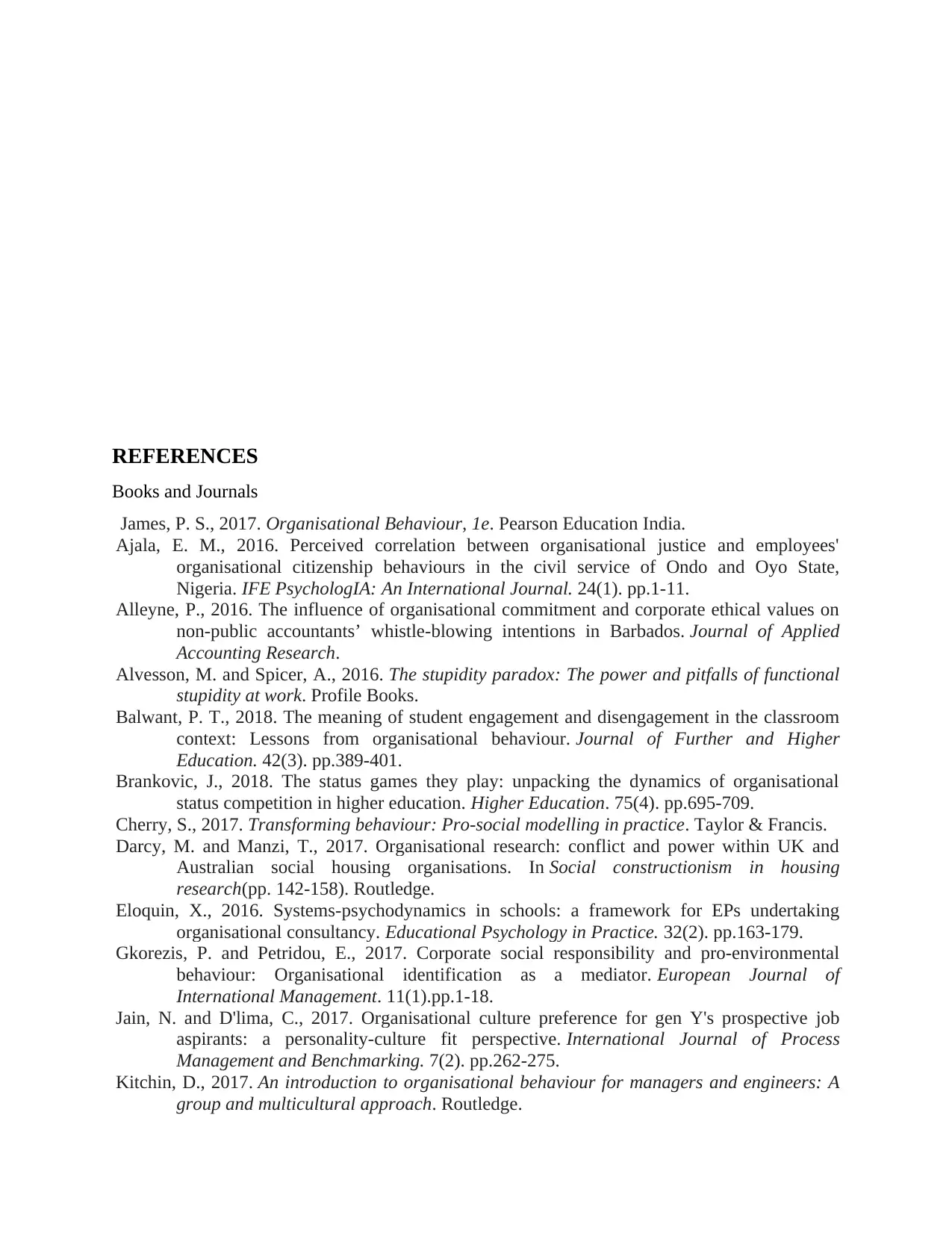
REFERENCES
Books and Journals
James, P. S., 2017. Organisational Behaviour, 1e. Pearson Education India.
Ajala, E. M., 2016. Perceived correlation between organisational justice and employees'
organisational citizenship behaviours in the civil service of Ondo and Oyo State,
Nigeria. IFE PsychologIA: An International Journal. 24(1). pp.1-11.
Alleyne, P., 2016. The influence of organisational commitment and corporate ethical values on
non-public accountants’ whistle-blowing intentions in Barbados. Journal of Applied
Accounting Research.
Alvesson, M. and Spicer, A., 2016. The stupidity paradox: The power and pitfalls of functional
stupidity at work. Profile Books.
Balwant, P. T., 2018. The meaning of student engagement and disengagement in the classroom
context: Lessons from organisational behaviour. Journal of Further and Higher
Education. 42(3). pp.389-401.
Brankovic, J., 2018. The status games they play: unpacking the dynamics of organisational
status competition in higher education. Higher Education. 75(4). pp.695-709.
Cherry, S., 2017. Transforming behaviour: Pro-social modelling in practice. Taylor & Francis.
Darcy, M. and Manzi, T., 2017. Organisational research: conflict and power within UK and
Australian social housing organisations. In Social constructionism in housing
research(pp. 142-158). Routledge.
Eloquin, X., 2016. Systems-psychodynamics in schools: a framework for EPs undertaking
organisational consultancy. Educational Psychology in Practice. 32(2). pp.163-179.
Gkorezis, P. and Petridou, E., 2017. Corporate social responsibility and pro-environmental
behaviour: Organisational identification as a mediator. European Journal of
International Management. 11(1).pp.1-18.
Jain, N. and D'lima, C., 2017. Organisational culture preference for gen Y's prospective job
aspirants: a personality-culture fit perspective. International Journal of Process
Management and Benchmarking. 7(2). pp.262-275.
Kitchin, D., 2017. An introduction to organisational behaviour for managers and engineers: A
group and multicultural approach. Routledge.
Books and Journals
James, P. S., 2017. Organisational Behaviour, 1e. Pearson Education India.
Ajala, E. M., 2016. Perceived correlation between organisational justice and employees'
organisational citizenship behaviours in the civil service of Ondo and Oyo State,
Nigeria. IFE PsychologIA: An International Journal. 24(1). pp.1-11.
Alleyne, P., 2016. The influence of organisational commitment and corporate ethical values on
non-public accountants’ whistle-blowing intentions in Barbados. Journal of Applied
Accounting Research.
Alvesson, M. and Spicer, A., 2016. The stupidity paradox: The power and pitfalls of functional
stupidity at work. Profile Books.
Balwant, P. T., 2018. The meaning of student engagement and disengagement in the classroom
context: Lessons from organisational behaviour. Journal of Further and Higher
Education. 42(3). pp.389-401.
Brankovic, J., 2018. The status games they play: unpacking the dynamics of organisational
status competition in higher education. Higher Education. 75(4). pp.695-709.
Cherry, S., 2017. Transforming behaviour: Pro-social modelling in practice. Taylor & Francis.
Darcy, M. and Manzi, T., 2017. Organisational research: conflict and power within UK and
Australian social housing organisations. In Social constructionism in housing
research(pp. 142-158). Routledge.
Eloquin, X., 2016. Systems-psychodynamics in schools: a framework for EPs undertaking
organisational consultancy. Educational Psychology in Practice. 32(2). pp.163-179.
Gkorezis, P. and Petridou, E., 2017. Corporate social responsibility and pro-environmental
behaviour: Organisational identification as a mediator. European Journal of
International Management. 11(1).pp.1-18.
Jain, N. and D'lima, C., 2017. Organisational culture preference for gen Y's prospective job
aspirants: a personality-culture fit perspective. International Journal of Process
Management and Benchmarking. 7(2). pp.262-275.
Kitchin, D., 2017. An introduction to organisational behaviour for managers and engineers: A
group and multicultural approach. Routledge.
Paraphrase This Document
Need a fresh take? Get an instant paraphrase of this document with our AI Paraphraser
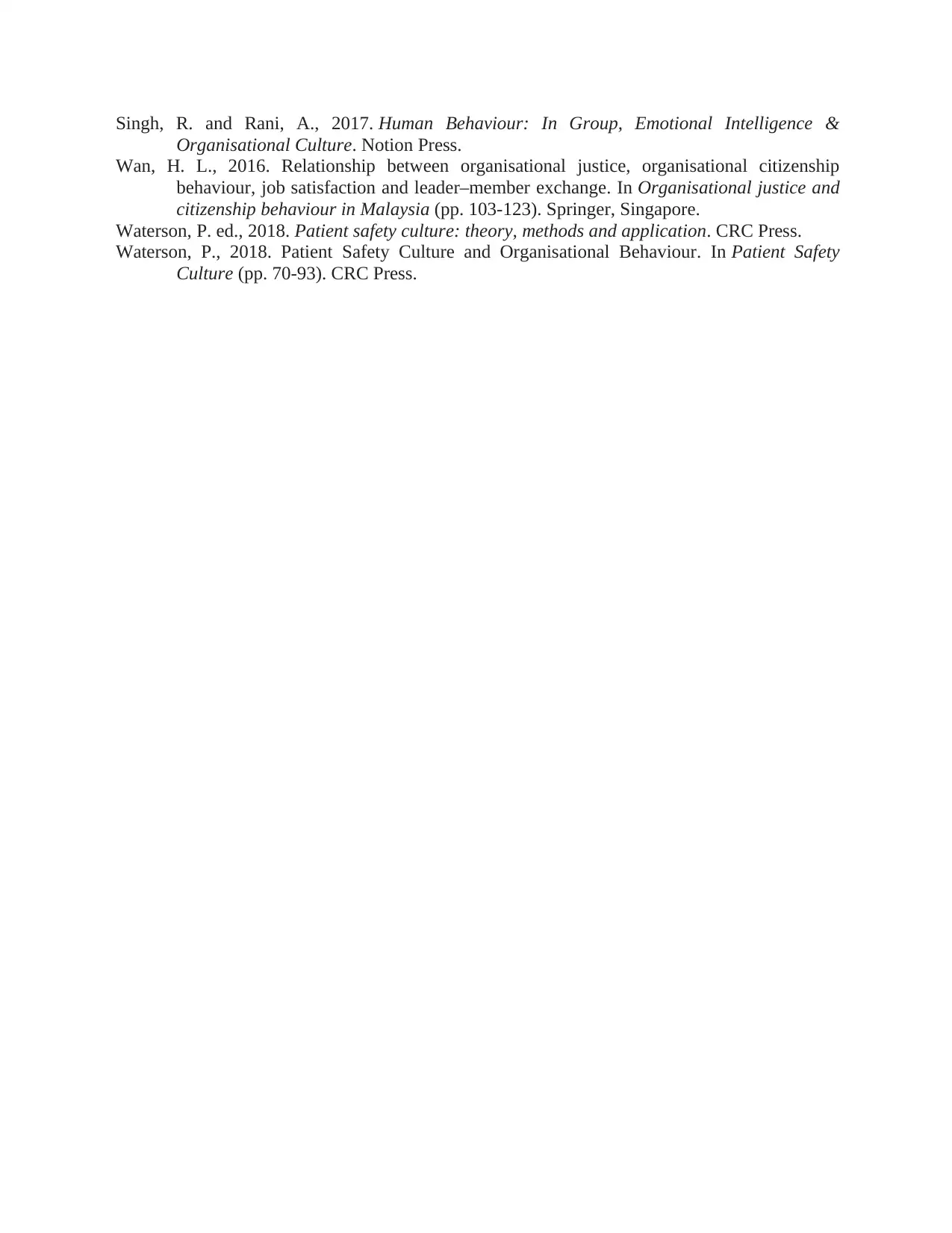
Singh, R. and Rani, A., 2017. Human Behaviour: In Group, Emotional Intelligence &
Organisational Culture. Notion Press.
Wan, H. L., 2016. Relationship between organisational justice, organisational citizenship
behaviour, job satisfaction and leader–member exchange. In Organisational justice and
citizenship behaviour in Malaysia (pp. 103-123). Springer, Singapore.
Waterson, P. ed., 2018. Patient safety culture: theory, methods and application. CRC Press.
Waterson, P., 2018. Patient Safety Culture and Organisational Behaviour. In Patient Safety
Culture (pp. 70-93). CRC Press.
Organisational Culture. Notion Press.
Wan, H. L., 2016. Relationship between organisational justice, organisational citizenship
behaviour, job satisfaction and leader–member exchange. In Organisational justice and
citizenship behaviour in Malaysia (pp. 103-123). Springer, Singapore.
Waterson, P. ed., 2018. Patient safety culture: theory, methods and application. CRC Press.
Waterson, P., 2018. Patient Safety Culture and Organisational Behaviour. In Patient Safety
Culture (pp. 70-93). CRC Press.
1 out of 14
Related Documents
Your All-in-One AI-Powered Toolkit for Academic Success.
+13062052269
info@desklib.com
Available 24*7 on WhatsApp / Email
![[object Object]](/_next/static/media/star-bottom.7253800d.svg)
Unlock your academic potential
© 2024 | Zucol Services PVT LTD | All rights reserved.




